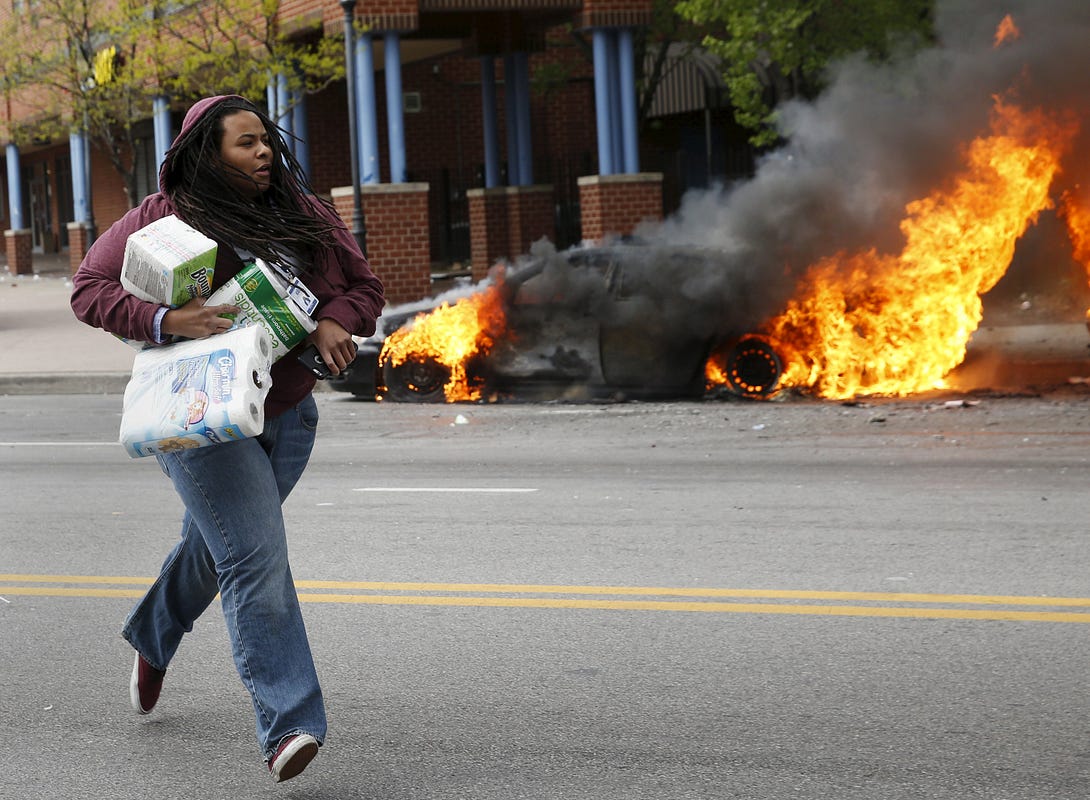While this is happening here, I start reading about the riots happening in Baltimore and the inevitable reactions of people that fall along the lines of, "Stealing big-screen TVs isn't the right way to express your outrage. [Stupid, poor, black people.]" I feel like that misses the bigger picture in a big way.
I couldn't agree more that breaking into a store and taking luxury items is not as effective a method of protesting as the Montgomery bus boycott. But it's not that simple and not everyone is Martin Luther King, Jr. or Rosa Parks. Some people are responding to built-up feelings of disenfranchisement without logic or reason or calmly-thought-out plans. Dr. King had some words of wisdom regarding riots:
It is not enough for me to stand before you tonight and condemn riots. It would be morally irresponsible for me to do that without, at the same time, condemning the contingent, intolerable conditions that exist in our society. These conditions are the things that cause individuals to feel that they have no other alternative than to engage in violent rebellions to get attention. And I must say tonight that a riot is the language of the unheard.To me, condemning the rioters without examining the circumstances of their acts misses a chance to understand our society, and our fellow Americans, better. People don't take to the streets en masse and start destroying their neighborhoods without pretty strong feelings about something. Interestingly, Medium.com ran a story that collects up pictures of looters in Baltimore where these law-breakers are carrying bags stuffed with toilet paper and tampons. While others may have been stealing iPhones and TVs, let's not let our outrage blind us to what is underlying the unrest: poverty and disenfranchisement.
 |
| From "Would you break the law for toilet paper and Tampax?" |
Don't you just hate when facts get in the way of an agenda, political or social. #Baltimoreriots Crazy! pic.twitter.com/sLNtjoibDp
— KEEMSTAR #DramaAlert (@KEEMSTARx) April 28, 2015
What's wrong with this? Two things, the first is just straight mathematical, coming from how to read statistics. The second has to do with context and the importance of not relying on statistics without examining the circumstances.#1: The chart shows a total of 1,111 deaths by police shootings in 2014, with 233 victims identified as African-American compared to 414 White victims, 138 Hispanic and 311 unidentified. Ignoring that 28% of the victims are of unidentified race and the complications arising from considering "Hispanic" a racial category when many Hispanics consider themselves either Black or White, let's take a closer look at the numbers:
- 233 African-American victims represent 21% of the total victims for the year, while according to the 2010 US census, 12.2% of the population identify as non-Hispanic Black.
- 414 White victims represent 37.3% of the total, while the 2010 census reported that 63.7% of the population identifies as non-Hispanic White (72.4% of the population identifies as White, when "non-Hispanic" isn't separated.)
This is to say, the percentage of Black victims of police shootings is much higher than the percentage of African-Americans in the general population, while White victims make up a smaller percentage of victims than they do the whole population of the US.
#2: These statistics taken as numbers without context ignore the whole point. People are not upset only because of the number of deaths, but because of the circumstances: the circumstances of poverty and lack of opportunity that lead to more confrontations with the police, the number of unarmed Black citizens who are shot or assaulted by police, the lack of follow-up investigation or the cover-up of these incidents, the way that Black victims are represented in the press, all the other aspects of systemic racism and classism that that can't be captured in one single statistic.
The irony of that screenshot is that FatalEncounters.org, cited as the source of the numbers, includes the following statement in its "About" page:
This site is founded upon the premise that Americans should have the ability to track [the most significant act police can do in the line of duty: take a life]. This idea was conceived in the wake of the Oct. 6, 2012, killing of a naked, unarmed college student, Gil Collar, at the University of South Alabama. Media reports contained no context: How many people are killed by police in Alabama every year? How many in the United States?
Then the numbers collected from the site are pulled out with zero context.
The first clue that the numbers shown in that chart miss something is the simple fact that White people are not more outraged about police violence. Either the majority of African-Americans are living under a delusional persecution complex, or there is something systemic going on that affects African-Americans more than White people. If rioting is indeed the language of the unheard, we need to start listening if we want to promote peaceful solutions.
Also, let's not ignore the good deeds being done in Baltimore. Although the focus is on the destruction, there are reports, too, of various neighborhood clean-up campaigns and people trying to stop conflicts before they start.
